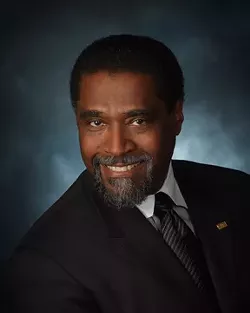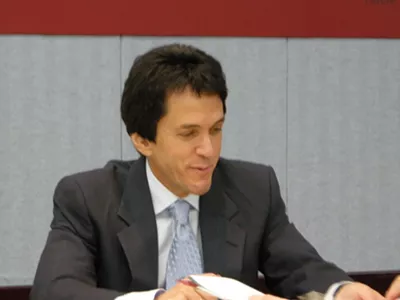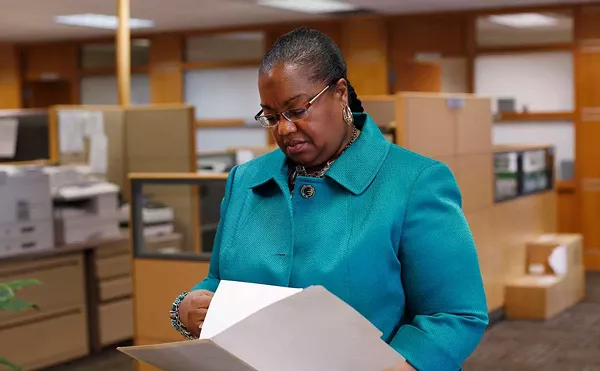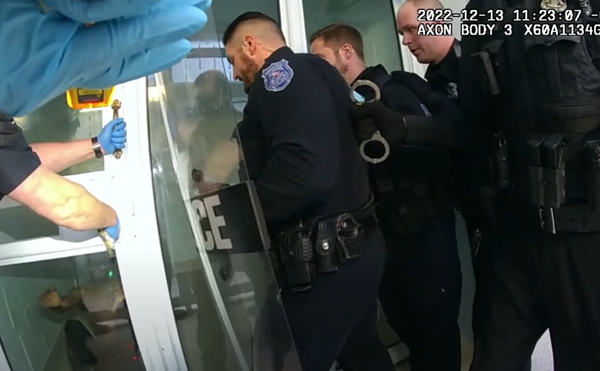
Audio By Carbonatix
[
{
"name": "GPT - Leaderboard - Inline - Content",
"component": "35519556",
"insertPoint": "5th",
"startingPoint": "3",
"requiredCountToDisplay": "3",
"maxInsertions": 100,
"adList": [
{
"adPreset": "LeaderboardInline"
}
]
}
]

The news on first glance appears to be party-hat and piñata worthy. A true celebration. Earley, after all, is not only DPS's current EM, but he was running the show in Flint in April 2014 when the beleaguered city decided to draw water from the Flint River. Earley, accountable to no one but the governor, was head honcho when Flint citizens began running corrosive, lead-potent water out of their taps. And since April 2015, Earley has been the guy in charge of DPS — a district that has been thrust into the national spotlight in recent months as frustrated teachers and students take part in "sick outs" to draw attention to egregious working conditions.
In other words, Earley is more or less toxic these days.
Even Detroit News' Ingrid Jaques, who has been more than critical of the protesting educators — calling, with the rest of the editorial board, for striking teachers to be punished — has been vocal about the need for Earley to be cut loose.
"The emergency manager of Detroit Public Schools is now irrevocably tainted by his time in that same role for the city of Flint," Jacques wrote on January 15, later adding, "The governor has a major perception problem having Earley at the helm of the financially failing DPS. And reports this week of school buildings that are unsafe and unclean for children only make it more obvious that this emergency manager is no longer a good fit."
While we commend Jacques for recognizing the need for Earley's departure, we believe her thesis (Earley needs to go because the governor has a perception problem) is exactly why this is not the time to be celebrating.
Earley is one in a long line of emergency managers, so while he has been detrimental for the district, we can not view his removal in a vacuum. The unsafe, unclean conditions that Jacques spoke of did not happen overnight. They did not arrive with Earley. And getting rid of Earley does not suddenly transform these schools, class sizes or — and most importantly — bring democracy and accountability back to Detroit's schools.
Earley is Detroit's fourth emergency manager in nearly six years. In January 2009 then-Governor Jennifer Granholm appointed Robert Bobb to run the district. From there we got Roy Roberts, Jack Martin and now Earley. In that time Detroit's deficit has ballooned — an irony that has not been lost — and the very conditions teachers working under Earley are speaking out against were calcified.
"Darnell Earley is not the problem, the problem is the Emergency Manager Law," says Dr. Thomas Pedroni an associate professor of curriculum studies at Wayne State University and director of Detroit Data Democracy. Pedroni, who has been studying the effects of state oversight under DPS emergency management and under the state-controlled Education Achievement Authority, believes, as Jaques implied, that Earley's resignation is more of a gift to Gov. Snyder than a signifier of actual change.
"Snyder wants a fall guy as much as everyone else. He can now say, 'look I am taking this seriously, I am listening,'" says Pedroni. "Hopefully he will find this isn't enough. People will see through that. As destructive as Darnell's tenure in both jobs has been to the well-being of children, he was taking commands from Snyder."
When Gov. Snyder came into office in January 2011 he expanded the powers of emergency managers. The 'Financial' was dropped from the title (remember those EFMs) because their duties were no longer singularly zeroed in on money. Snyder's changes mean Emergency Managers can now end contracts — collective bargaining, the works — create and scrap provisions, sell public assets, and decide how much autonomy elected officials have over schools. In the case of DPS, the elected school board lost everything.
This carte blanche rule over a district or city raises questions — where does the governor's vision end and the EM's start? As we know from Flint, the relationship between the governor and Emergency Manager is complicated and often obscured.
Public documents and statements over the years, however, have given us some insight into how these machinations work.
In September 2014, as the state-run Education Achievement Authority entered into its second year — and continued to flounder — the Eastern Michigan University Board of Regents met to discuss the state of a district they were helping to authorize. The meeting, while about the EAA, provided those in attendance with a deeper understanding of how Lansing, and specifically Gov. Snyder's administration, were molding Detroit schools — with and without the help of EMs.
For those unfamiliar, the EAA is an inter-local agreement between then-DPS Emergency Manager Roy Roberts and EMU's Board of Regents. The EAA was supposed to be a district for the state's lowest performing schools; it ended up, however, just being comprised of Detroit schools, primarily from DPS. Its board is not elected but rather composed of seven members of Gov. Snyder’s choosing, two members of Roy Robert’s choosing, and two members of EMU's choosing. The idea of the EAA is often attributed to Roy Roberts since he was the EM at the time; however, at the September 2014 meeting a different genesis was detailed.
Jim Stapelton, a member of EMU's board of regents, shared information about a dinner he was invited to with Gov. Snyder in April 2011, two months before the EAA plan was announced to the public. The gathering, at an Ann Arbor steakhouse, included Stapleton, the governor, Snyder aide Richard Baird (who was recently deployed to work on Flint water response), then-Snyder chief-of-staff Dennis Muchmore, Snyder's "volunteer education advisor" Richard McLellan, and someone from the pro-charter, corporate ed reform powerhouse the Eli Broad Foundation.
At the dinner — which Gov. Snyder left early — Baird detailed plans for the EAA, and asked Stapleton if EMU would be interested in signing on as partner. While these are interesting facts, the real zinger comes after the dinner meeting was over. According to Stapleton's testimony, two days later he got together with Roberts — the guy running DPS at the time — who had no idea about the EAA or the plan for this state-run district. "Roy did not know a thing about this," said Stapleton (you can listen to the recording, provided by Pedroni, below).
While Roberts became the public face of the EAA, this behind-the-scenes planning points to the puppetry often associated with EMs. Today the EAA is known nationally as a failure. In December Gov. Snyder even spoke openly about ending the supposed-reform district. Who is to blame for the failure, however, just like the Flint water crisis, is completely and utterly shrouded.
There is even more documentation of the odd relationship between Lansing and Detroit. Take for example this paragraph in Michigan's May 2010 application for a charter school planning grant from when then-Gov. Jennifer Granholm was at the helm (emphasis made by us).
"Additionally, through collaborative efforts and support of Detroit's Emergency Financial Manager (Robert Bobb) assigned by Michigan's Governor, the state maintains a level of oversight and direct involvement not seen in other municipalities. It should be noted that Mr. Bobb's title may be a little deceptive since he is not just the financial manger but he has also exercised influence over a wide range of activities within the Detroit Public Schools including the reorganization of the district and the identification of schools to be closed and/or otherwise transformed. As a matter of fact, it is his vision and plan for transforming Detroit Public Schools that is currently being implemented."
While the statement notes that Bobb is running the show it also drives home the close relationship between Lansing and DPS; a relationship that is so close that it is noted as an asset in an application for federal grant money to open more charter schools, one of the biggest competitors for DPS and a major contributor to the district's dwindling enrollment, and in turn, funding. According to the National Alliance for Public Charter Schools, Detroit ranks number two nationally for charter enrollment. The city is right
Factoids like this raise questions about the overarching goals of Lansing (vis-a-vis Emergency Managers and state-run districts like the EAA). More specifically, however, they point to the fact that Earley is not why DPS is what it is today. Earley is a cog in a machine. While his actions and attitude towards frustrated teachers are nothing to commend, we need to keep perspective about the bigger picture.
Sure we need to hold him accountable for his decisions — decisions like spending $6 million on a questionable Professional Development program, Marzano, when classrooms are overcrowded and students in some schools are being shuffled from sub to sub since their schools lack full-time teachers. But we also need to remember Earley is not the first of the EMs to make eyebrow raising decisions like this.
Bobb, for example, brought on fraudulent Barbara Byrd-Bennett as the Chief Academic and Accountability Officer in 2009. She was paid close to $18,000 a month for her work, according to a must-read report on DPS by Curt Guyette, and the six consultants she brought on were paid a total of $700,000 for nine months of work. This is questionable.
How about Roberts? While we now know he was likely pretty out of the loop when it comes to decisions like the EAA, we still can't ignore the fact that he was the face of DPS and in turn the closest thing to the EAA when Chancellor John Covington was appointed to run the experimental reform district. The latter resigned in a whirlwind of controversy after the media reported that he and his staff spent nearly $200,000 on hotel bills and airfare between 2012 and 2013 in efforts to promote the district and to attend professional development conferences. This was in addition to the $240,000 Covington personally spent with two EAA credit cards on hotels, airfare, gas and Ikea furniture. Don't get us started on the experimental technology he brought into EAA classrooms.
Martin? Yeah, you can guess, more questionable decisions. Take for example his decision to award hefty bonuses to three DPS administrators months before his term as EM came to close. We're talking an $18,000 bonus for the "innovation" officer who was already making well over $100,000 and had a monthly car allowance of $600, because as Martin told the Free Press, "They will be going out and visiting schools." Lest we forget Martin was the same EM who months earlier proposed 10 percent pay decreases for all DPS teachers.
None of these men, like Earley, were accountable to anyone but the governor. The conditions we see today are a product of their work.
So, yes, while it is great to see Earley heading out the door, please remember, while he may have created problems, he is not the problem. The system is the problem. And Lansing and the Detroit News Editorial Board should not be confused if and when sick-outs continue — even with Earley gone.





